FEATURED COMPANY

Williams (NYSE: WMB) is a FORTUNE 500 investment grade corporation and a leader in clean energy infrastructure. Williams handles 30% of the country’s natural gas, and it owns and operates infrastructure that safely and reliably delivers the natural gas that is used every day to affordably heat our homes, cook our food and generate our electricity. As the world moves to a low-carbon future, Williams is well-positioned to leverage its natural gas-focused strategy while continuing to deliver consistently stable returns for shareholders. With operations across the natural gas value chain spanning the United States, Williams is one of the largest natural gas providers to the growing global market for liquefied natural gas (LNG) exports.
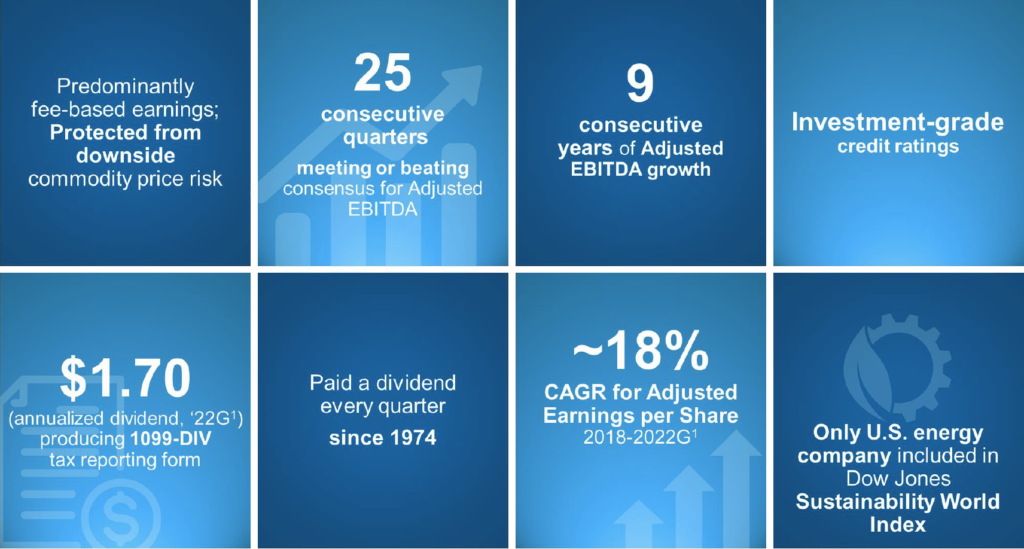
Advisor Access spoke with Williams’ president and CEO, Alan Armstrong, about the company’s business strategy, plans for future growth, financial strength and focus on environmental, social and governance (ESG) matters.
Click to view the Williams Fact Sheet.

Advisor Access: Can you tell us a bit about Williams’ business model?
Alan Armstrong: At Williams, our vision is to provide the best transport, storage and delivery solutions for reliable, low-cost, low-carbon energy. Our midstream assets serve critical demand sectors, such as residential and commercial natural gas utilities, power generation, industrial facilities and LNG exports.
Our strategy is primarily driven by natural gas demand. Most of our customer contracts involve either fee-based earnings or long-term take-or-pay commitments for transmission pipeline capacity, which create reliable and stable earnings. We are well-protected from downside risk presented by fluctuating commodity prices and rising inflation, yet we are well-positioned to capture upside exposure in a strong natural gas environment.
We have the largest natural gas focused portfolio among U.S. midstream competitors, and our intense focus on our natural gas-based strategy has built a business that is steady and predictable with continued growth, improving returns and free cash flows.

Advisor Access: Why is a natural gas focused strategy so important to you?
Armstrong: We continue to believe in the importance of natural gas to serve growing demand for low-carbon energy across the world, and we see a robust demand outlook ahead that underpins our growth strategy. Natural gas has been, and will continue to be, a cornerstone of our nation’s prosperity in the 21st century as it has driven significant reductions in U.S. CO2 emissions, lowered consumers’ utility bills and paved the way for investment in renewables.2 Natural gas is affordable, reliable and has a cleaner emissions profile than other traditional energy sources making it a key fuel choice to meet future energy demand around the world.
Natural gas will be key to meeting future energy demand
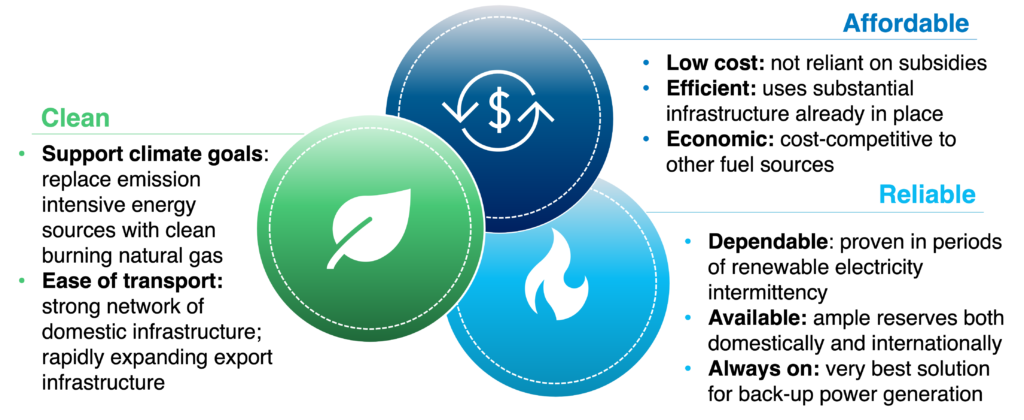
Advisor Access: Williams has an expansive footprint, and it is well-positioned to capture growing natural gas demand. Can you tell us a bit about your company’s growth outlook?
Armstrong: Our natural gas transmission pipelines are ideally positioned near densely populated areas and along U.S. Gulf Coast LNG export facilities, depicted in the map below. This strategic positioning provides us with opportunities to benefit from both domestic and international natural gas demand growth. As of May 2022, we are executing on six unique transmission expansion projects totaling 1.9 billion cubic feet/day (Bcf/d) and are pursuing a backlog of an additional ~25 unique transmission project opportunities totaling 10 Bcf/d. Through strong project execution, we continue to bring projects on line, moving backlog projects into execution, and backfilling this backlog with additional opportunities. This is evidenced by the fact that our contracted capacity has more than doubled since 2005, reaching ~24.4 Bcf/d in the first quarter of 2022.
Speaking to international natural gas demand, LNG exports currently present the largest natural gas demand growth outlook in the United States as volumes are expected to more than double through 2035.3 Importantly, all the approved U.S. LNG export facilities are located within our pipeline corridor, creating additional opportunities for expansions on our Transco pipeline.
In addition to increased opportunities for transmission pipelines to meet growing demand, we also see a growth trajectory for our Gathering and Processing (G&P) and Deepwater Gulf of Mexico businesses. In our G&P business, we are active in 14 geographically diverse supply areas led in scale by Appalachia, the largest and most economic U.S. natural gas basin. Since 2005, our gathering volumes increased over 4x, reaching ~15.1 Bcf/d in the first quarter of 2022. We have an unmatched competitive position in the Deepwater Gulf of Mexico and are seeing continued drilling activity near our infrastructure. We are also executing on six deepwater expansion projects that are expected to approximately double Deepwater Gulf of Mexico annualized Adjusted EBITDA by 2025. The robust natural gas demand outlook we see today will drive additional volumes through our G&P and Deepwater Gulf of Mexico assets.
Williams Assets Near Natural Gas Demand Centers,
Positioning It for Continued Growth
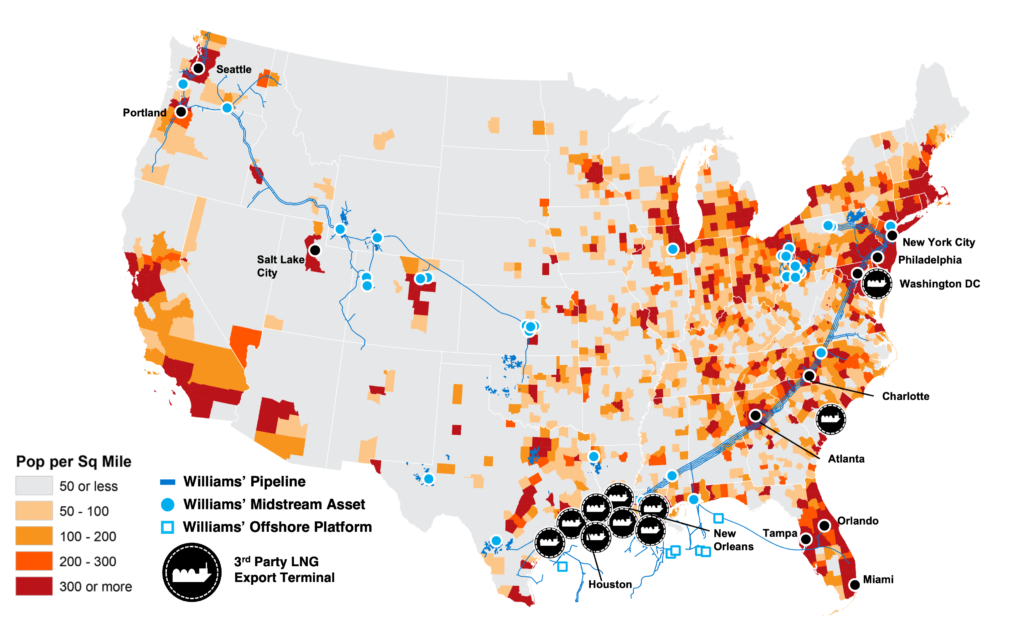
Advisor Access: Williams has continued to strengthen its balance sheet while increasing earnings. Given your strong financial position, how do you plan to return value to shareholders?
Armstrong: In 2021, we achieved our long-term leverage ratio target, and consequently, received improved credit ratings. This was driven by record earnings and annual Adjusted EBITDA growth for the 9th consecutive year. Given our healthy balance sheet, financial flexibility and excess cash flow generation, we recently announced the following capital allocation priorities:
- Balance Sheet Strength: Protect our investment-grade credit ratings
- Dividends: Preserve the dividend and increase annually in line with EBITDA growth
- Reinvest: Invest capital toward traditional gathering, processing and transmission growth projects with high returns
- Emissions Reduction Program and Renewables: Invest in our emissions reduction projects while generating a regulated return, and allocate capital toward New Energy Ventures
- Financial Flexibility: Allocate excess cash toward lowering debt, stock buybacks and/or strategic acquisitions
Advisor Access: Williams has paid a quarterly dividend since 1974. Can you discuss why the dividend is important to Williams? How would you describe your dividend policy to shareholders?
Armstrong: Williams is committed to delivering shareholder value. Our long-standing dividend commitment remains important to Williams’ executive management and Board of Directors. It is top of our capital allocation priorities list, along with maintaining investment-grade credit ratings. When looking forward to our 2022 dividend expectations, we plan to pay an annualized dividend of $1.70 per share, an increase of 4% over 2021, pending Board approval. Our current dividend policy is to continue to grow the dividend in pace with annual EBITDA growth, while maintaining strong dividend coverage. Our 2022 dividend coverage ratio expectation is 2.22x. I’ll also point out that a portion of our quarterly distributions may be considered return of capital for tax purposes. Additional information regarding return of capital distributions is available on Williams’ Investor Relations website.

Advisor Access: Williams was the first North American midstream company to set aggressive climate targets, and it is at the forefront of the transition to a low-carbon fuel future. Can you explain your emissions reduction goal and how you plan to get there?
Armstrong: In 2020, we announced our climate commitment, setting a 2030 goal to reduce our company-wide scope 1 and scope 2 greenhouse gas emissions on an absolute basis by 56%, based on our 2005 levels. So far, we have made a 47% absolute reduction in our emissions, so we are well on our way to meeting our goal. By setting a near-term goal for 2030, we plan to leverage our natural gas-focused strategy and technology that is available today to reduce emissions, scale renewables and build a clean energy economy. Our 2030 goal puts us on a trajectory for net zero carbon emissions by 2050. We are exploring and investing in next generation technologies including hydrogen and carbon capture and storage, and we are leaning into solar and battery technology to help power our own operations. We are excited to continue to show how natural gas infrastructure complements renewables, and to invest in new energy ventures that will keep Williams at the forefront of technological changes within the midstream natural gas industry. For more information, please visit our climate commitment.
Williams Emissions Reduction Roadmap
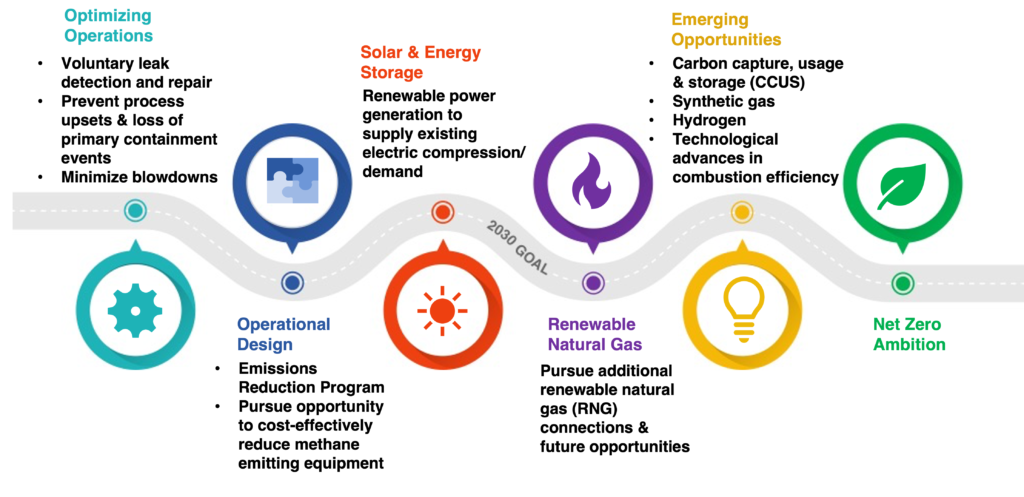
Advisor Access: What makes Williams a unique investment opportunity?
Armstrong: We are uniquely positioned with exceptional financial strength, flexibility and growth opportunities. Williams remains steadfast in creating long-term shareholder value by maintaining a healthy balance sheet, executing on growth opportunities and protecting the viability of our dividend. Our expansive footprint of energy infrastructure and robust natural gas demand outlook creates ample growth opportunities. We will continue to advance a sustainable, long-term strategy to assure that we remain a relevant player in the energy landscape for years to come.
Advisor Access: Thank you, Alan.
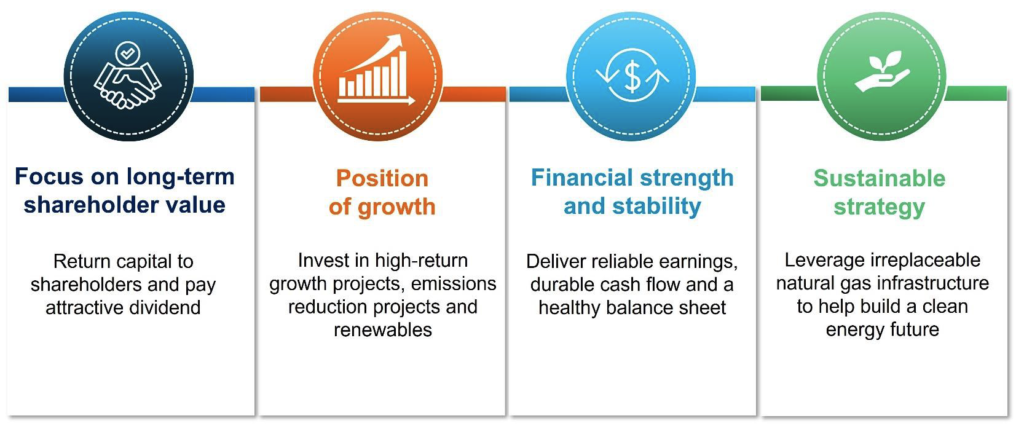
1 Midpoint of our updated 2022 Guidance, issued on May 2nd, 2022
2 Statements based on EIA data
3 Source: Wood Mackenzie March 2022 NAGS forecast
4 As of February 2022. Source: Data based off 2020 Census estimates
Disclosures
This document contains non-GAAP financial measures, including Adjusted EBITDA and Adjusted Earnings per Share. These non-GAAP financial measures should not be considered in isolation or as substitutes for a measure of performance prepared in accordance with United States generally accepted accounting principles (GAAP). For a full reconciliation of the 2018-2021 non-GAAP financial measures to their nearest GAAP financial measures, please see our 2022 Analyst Presentation, dated 02/22/22. For a full reconciliation of the 2022 financial guidance, please see our first-quarter 2022 earnings press release, dated 05/02/22. Both can be found under the Investor Relations tab of our website.
This document may contain or incorporate by reference statements that do not directly or exclusively relate to historical facts. Such statements are “forward-looking statements” within the meaning of Section 27A of the Securities Act of 1933, as amended (Securities Act), and Section 21E of the Securities Exchange Act of 1934, as amended (Exchange Act). These forward-looking statements relate to anticipated financial performance, management’s plans and objectives for future operations, business prospects, outcome of regulatory proceedings, market conditions, and other matters. We make these forward-looking statements in reliance on the safe harbor protections provided under the Private Securities Litigation Reform Act of 1995. Forward-looking statements are based on numerous assumptions, uncertainties, and risks that could cause future events or results to be materially different from those stated or implied in this document. Many of the factors that will determine these results are beyond our ability to control or predict. Given the uncertainties and risk factors that could cause our actual results to differ materially from those contained in any forward-looking statement, we caution investors not to unduly rely on our forward-looking statements. We disclaim any obligations to and do not intend to update the policy list of specific factors that could cause actual results to differ from results contemplated by the forward-looking statements. Nor do we intend to announce publicly the result of any revisions to any of the forward-looking statements to reflect future events or developments. For a detailed discussion of our forward-looking statements and other risk factors that may cause actual result to differ materially from those contained in forward-looking statements, please see our most recent annual report on Form 10-K filed with the SEC as updated in reports filed with the SEC, which are located under the Investor Relations tab of our website. Williams has paid Advisor Access a fee to distribute this email. Williams had final approval of the content, and Advisor Access is not responsible for any reliance on the statements contained herein.
About Advisor Access
Advisor-Access LLC was designed to bring compelling investment ideas to investors in the form of in-depth interviews with company management and the latest fact sheets and corporate presentations, in a concise format: the critical pieces of information an investor needs to make an informed investment decision. Read the Advisor-Access Full Disclosure Online.

